11. Transforming Pain into Power and Resilience
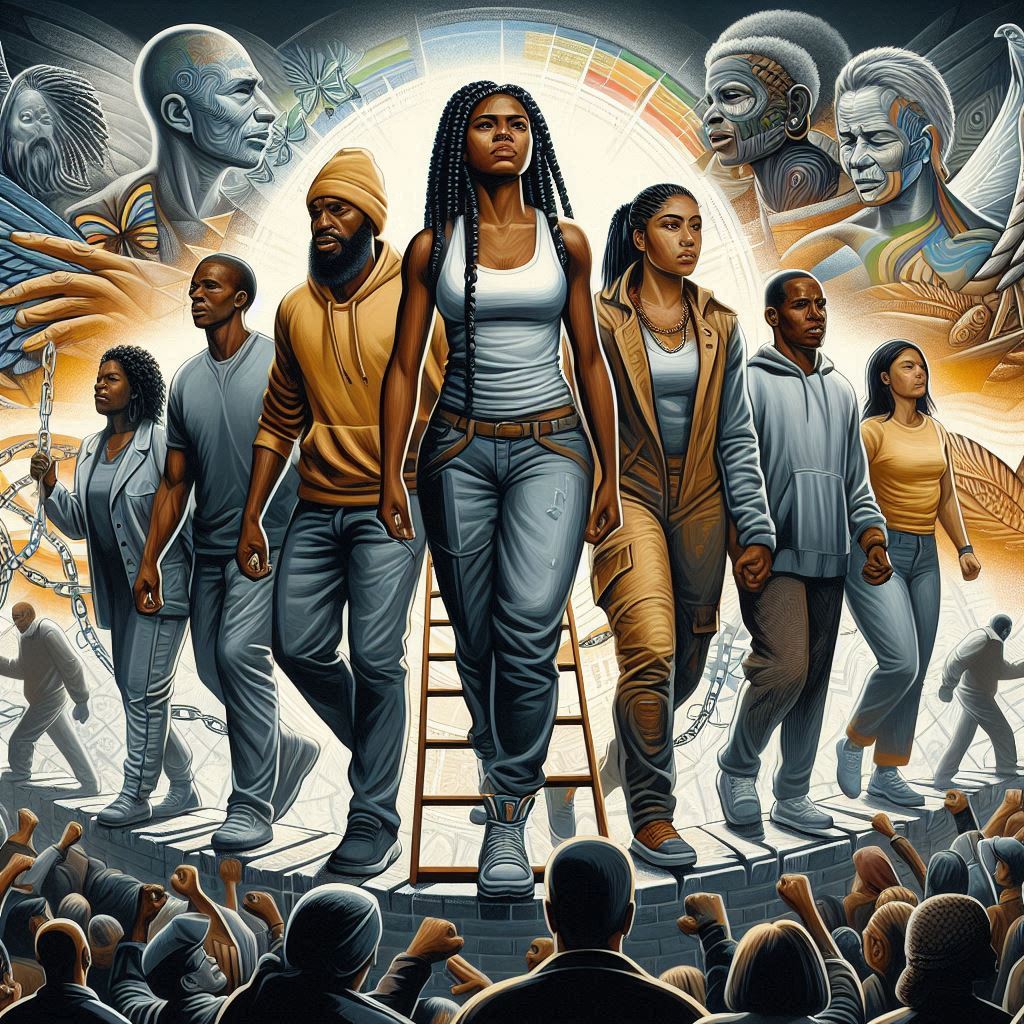
Pain is an inevitable part of life. Whether it stems from loss, trauma, rejection, or disappointment, it leaves an imprint that shapes how we see the world and ourselves. As a counsellor based in Hackney, East London, I’ve witnessed firsthand how pain can fracture a person’s sense of self. But I’ve also seen the remarkable capacity of human beings to transform pain into strength and resilience. This transformation is not about denying or bypassing pain — it’s about working through it, making sense of it, and emerging stronger as a result of it. My work is informed by both my lived experience and professional training. My therapy practice, based right here in Hackney, focuses on creating safe spaces for individuals to explore their emotions, confront their traumas, and ultimately harness their innate ability to heal and grow. I seek to provide a platform emphasizing authenticity, connection, and empowerment—I believe that every individual has the tools within themselves to turn adversity into opportunity. Let me share some insights on how you can embark on this journey. Acknowledging Your Pain The first step toward transforming pain into power is acknowledging it exists. It might sound simple, but denial or avoidance often keeps us stuck. Whether it’s grief over a lost loved one, anger stemming from injustice, or lingering feelings of inadequacy, ignoring these emotions only gives them more control over your life. Instead, allow yourself to sit with your pain without judgment. In my practice, I encourage clients to view their emotions not as enemies but as messengers. For instance, sadness may signal loss, while frustration could point to unmet needs. By listening to what your pain is trying to tell you, you begin to understand its roots. Authenticity starts with being honest with yourself. Only when we are truthful about our struggles can we start the healing process. Understanding Pain Pain is more than just an emotional wound — it affects our mental, physical, and spiritual well-being. According to the American Psychological Association (2017), emotional pain activates the same neurological pathways as physical pain, which is why heartbreak and grief can feel so physically intense. When left unaddressed, pain can manifest as anxiety, depression, and even physical illness (Van der Kolk, 2014). But pain also holds information — it points to what matters most to us and where healing is needed. I often meet clients who have developed protective barriers in response to painful experiences. These barriers can take the form of avoidance, emotional numbness, or destructive coping mechanisms. While these defences are understandable, they often prevent deeper healing. Transformation begins when we gently uncover the roots of that pain and begin to process it in a safe, non-judgmental space. Reframing the Narrative The next step is reframing your story. Too often, society tells us that suffering makes us weak or broken. But what if we shifted this perspective? What if we saw our hardships as teachers rather than burdens? For example, consider the countless stories of resilience born out of adversity—activists fighting for justice, artists channelling heartbreak into masterpieces, or survivors using their experiences to help others. These examples remind us that pain doesn’t define us; how we respond to it does. In therapy sessions, I guide clients to identify the lessons hidden in their struggles. Perhaps a difficult childhood taught you resourcefulness, or a failed relationship revealed patterns worth breaking. By focusing on growth rather than victimhood, you reclaim agency over your narrative. This shift aligns closely with the principles of empowerment-focused therapy, which emphasizes self-awareness and personal responsibility. Empowerment is the process of reclaiming agency over our lives. When we face pain directly and process it with support, we begin to recognise our inner strength. We learn that we are not defined by what happened to us — we are defined by how we respond to it. Transforming pain into power and resilience is not a linear process. It involves setbacks, difficult emotions, and moments of doubt. But it’s also a deeply rewarding process that fosters self-awareness, strength, and inner peace. Therapy provides a structured and supportive environment where pain can be explored without fear of judgment. My approach is grounded in the belief that healing is a collaborative process — the therapist is not the expert on the client’s life, but rather a partner in helping them uncover their inner strength. Drawing on psychodynamic and humanistic principles, I work with clients to explore how past experiences, and unconscious patterns shape their current emotional landscape. Building Emotional Resilience Resilience isn’t something you’re born with—it’s cultivated through practice. One way to build emotional resilience is by developing healthy coping mechanisms. This means finding constructive ways to manage stress, whether through mindfulness practices, journaling, creative expression, or physical activity. Many African and Afro-Caribbean cultures emphasize collective resilience, drawing strength from community bonds and shared experiences. This contrasts with more individualistic approaches to resilience seen in Western cultures. In Hackney, I’ve noticed how community plays a vital role in fostering resilience. Whether it’s attending local workshops, joining support groups, or simply connecting with neighbours, having a network of people who understand your journey can make all the difference. remember that you don’t have to walk this path alone. Healing is rarely a solitary endeavour—it thrives on connection. Here in Hackney, we’re fortunate to live in a vibrant, diverse community rich with opportunities for collaboration and support. Engaging with others who share your values or experiences can provide validation, encouragement, and inspiration. Therapy itself is a form of connection, offering a nonjudgmental space to explore your thoughts and feelings. If you’re hesitant about seeking professional help, know that doing so is a courageous act—one that demonstrates your commitment to your well-being. Another key aspect of resilience is self-compassion. Many of us are quick to criticize ourselves for perceived failures or shortcomings, especially when dealing with pain. However, self-criticism only deepens wounds. Practicing kindness toward yourself—not because you deserve pity but because you deserve care—is essential for healing. As I often tell
10. How to Support a Family Member Struggling with Mental Health
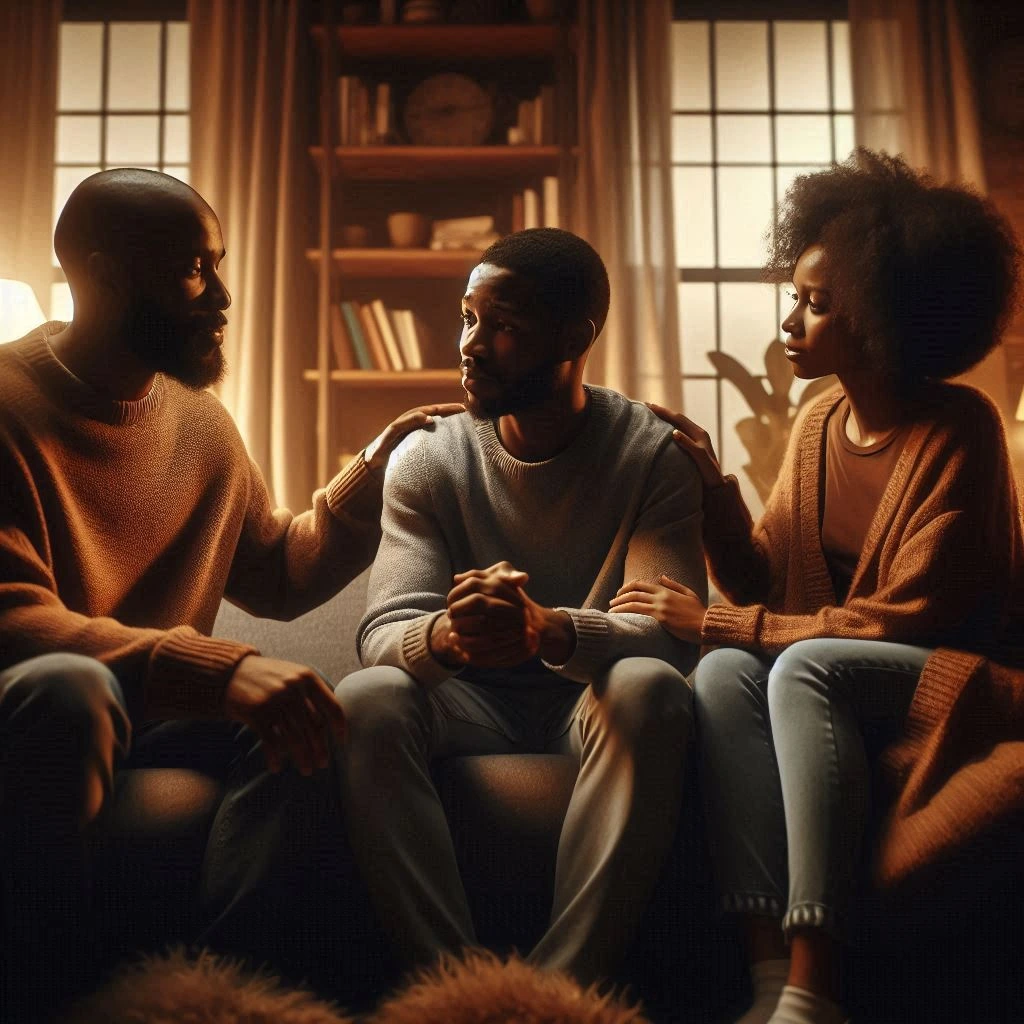
Supporting a loved one through mental health struggles can be challenging, especially when you feel unsure about the best way to help. As a counsellor based in Hackney, East London, I’ve seen firsthand how difficult it can be for families to navigate these situations. Mental health challenges often carry a sense of isolation and misunderstanding, which makes compassionate and informed support essential. Drawing on my experience and therapeutic approach, here are some key ways you can help a family member struggling with their mental health. Start with Compassion and Understanding When someone you love is struggling with their mental health, the first step is to approach them with compassion and understanding. It’s important to remember that mental health issues are not a choice or a weakness — they are complex challenges influenced by a range of emotional, psychological, and social factors. Instead of offering quick solutions, listen without judgment. Allow your family member to express their feelings openly without fear of being dismissed or misunderstood. Active listening means being present and attentive. Put away distractions, make eye contact, and show that you are genuinely engaged. Simple affirmations like “I hear you” or “That sounds really difficult” can make a significant difference. Educate Yourself About Mental Health Understanding the nature of mental health conditions can help you respond more effectively. Take the time to research common mental health issues such as depression, anxiety, and PTSD. Learn about the signs, symptoms, and potential triggers, but remember that everyone’s experience is different. Recognize that mental health struggles are not always visible. A person may appear to be coping outwardly while struggling internally. Educating yourself helps you avoid misunderstandings and equips you to offer more meaningful support. Encourage Professional Help Without Pressure While emotional support is crucial, professional help is often necessary for effective recovery. Encourage your family member to consider therapy or counselling but avoid pushing them if they’re not ready. You might say, “It might help to talk to someone about this — would you like me to help you find someone?” As a counsellor, I know how important it is for clients to feel ready and comfortable before starting therapy. It’s not about forcing the decision but opening up the possibility. You could offer to research therapists together or even accompany them to an initial session if they feel anxious. Maintain Boundaries While Offering Support Supporting someone through mental health challenges does not mean sacrificing your own well-being. It’s essential to set healthy boundaries to prevent emotional burnout. Let your family member know you’re there for them but also communicate your own needs and limits. For example, if you need time for yourself, say, “I really want to support you, but I need to rest tonight. Can we talk tomorrow?” Maintaining your own mental and emotional balance makes you better equipped to offer support. Offer Practical Help Sometimes, the most helpful thing you can do is provide practical support. Mental health struggles can make even basic tasks feel overwhelming. Offering to cook a meal, clean the house, or run errands can relieve some of that pressure. Be specific when you offer help: “Would it help if I picked up some groceries for you?” or “Would you like me to sit with you for a while?” These gestures show that you care and that your support is more than just words. Be Patient — Healing Takes Time Mental health recovery is rarely linear. There will be good days and setbacks along the way. Avoid showing frustration if progress seems slow. Patience and consistency are key. Celebrate small victories with your family member — even getting out of bed or attending a therapy session can be significant steps forward. Let them know that you’re proud of their progress, no matter how small it may seem. Respect Their Autonomy and Choices While you may want to protect your family member from further pain, it’s important to respect their autonomy. They might not always take your advice or follow the path you think is best — and that’s okay. Support them without trying to control their decisions. For instance, if they decide to change therapists or explore alternative coping strategies, honour their choice. Trust that they are working through their process in their own way. Take Care of Yourself Too Supporting someone through mental health struggles can be emotionally draining. Don’t neglect your own mental health in the process. Consider speaking to a therapist yourself or joining a support group for caregivers. Taking care of your own well-being allows you to show up more fully for your family member. Remember, you can’t pour from an empty cup. Conclusion: Support is a Journey, Not a Destination Supporting a loved one with mental health struggles is not about fixing their problems — it’s about walking alongside them on their journey. The goal is not to “solve” their mental health challenges but to provide consistent, compassionate support as they navigate their healing process. As a counsellor in Hackney, I’ve seen how powerful it can be when families come together with understanding and patience. By listening, educating yourself, encouraging professional help, and respecting boundaries, you can create a foundation of support that fosters healing and growth. Remember, you are not alone in this — and neither is your family member. References Weekes, P. (2025). Paul Weekes Therapy. Retrieved from https://paulweekestherapy.com Mind (2025). Supporting someone with mental health problems. Retrieved from https://www.mind.org.uk NHS (2025). How to support someone with a mental health problem. Retrieved from https://www.nhs.uk
9. How Black Parents Can Model and Teach Self-Care to Their Children
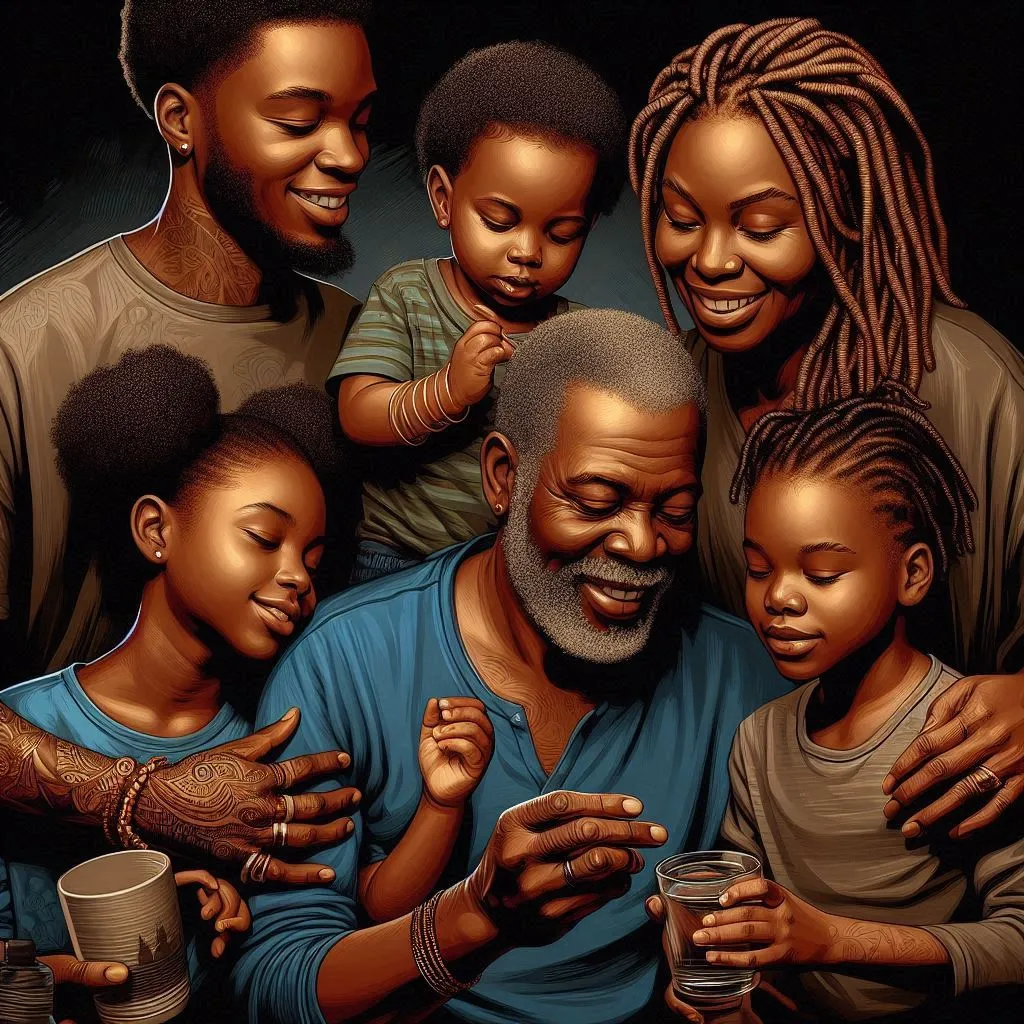
As a counsellor born and raised in Hackney, East London, and a Black British man of Afro-Caribbean heritage, I’ve had the privilege of both professional and personal experiences that underscore the importance of self-care. Having three daughters, now in their twenties, has further deepened my understanding of how vital it is for Black parents to model and teach self-care to their children. The Importance of Self-Care in Black Families Self-care is often misunderstood as a luxury or indulgence; however, it’s a fundamental aspect of maintaining mental, emotional, and physical health. For Black families, the necessity of self-care is amplified due to the unique challenges posed by systemic racism, cultural expectations, and societal pressures. Engaging in regular self-care practices can mitigate the adverse effects of these stressors, fostering resilience and well-being. Modelling Self-Care: Leading by Example Children learn significantly through observation. When parents prioritise their own self-care, they send a powerful message to their children about the value of personal well-being. Here are some strategies for modelling self-care: Prioritise Mental Health: Engage in activities that promote mental well-being, such as mindfulness, meditation, or therapy. Demonstrating a commitment to mental health normalises these practices for children. As I emphasise in my practice, creating a safe, confidential, and non-judgmental environment is crucial for exploring one’s thoughts and feelings. Maintain Physical Health: Incorporate regular physical activity into your routine and make conscious dietary choices. This not only benefits your health but also sets a standard for your children to emulate. Set Boundaries: Clearly define work and personal time. By setting boundaries, you teach your children the importance of balancing responsibilities with personal needs. Pursue Personal Interests: Dedicate time to hobbies and activities that bring joy and fulfilment. This encourages children to explore their own interests and understand the importance of personal satisfaction. Teaching Self-Care to Children Beyond modelling, it’s essential to actively teach children self-care practices tailored to their developmental stages. Emotional Literacy: Encourage children to identify and express their emotions. This can be achieved through regular conversations about feelings, helping them develop a robust emotional vocabulary. Understanding and naming emotions is a critical step toward effective self-care. Encourage Individuality: Support your child’s unique interests and talents, even if they differ from your own. This fosters a sense of autonomy and self-worth. Celebrating their individuality helps them appreciate their unique qualities and builds confidence. Promote Social Connections: Facilitate opportunities for your children to build and maintain healthy relationships. Strong social support is a vital component of self-care and overall well-being. Encourage participation in community activities, clubs, or groups that interest them. Teach Resilience Against Discrimination: Prepare your children for potential racial biases by fostering open discussions about race and identity. Equipping them with coping strategies enhances their resilience and self-esteem. These conversations can empower them to navigate societal challenges confidently. Creating a Self-Care-Friendly Environment The home environment plays a pivotal role in reinforcing self-care practices. Establish Routines: Consistent daily routines provide a sense of security and predictability, which is especially beneficial for children. Incorporate designated times for relaxation, hobbies, and family interactions. Designate Personal Spaces: Ensure that each family member has a personal space, no matter how small, where they can retreat and recharge. This physical boundary supports mental and emotional well-being. Encourage Open Communication: Foster an atmosphere where expressing thoughts and feelings is welcomed and valued. Regular family meetings or one-on-one check-ins can facilitate this openness. Celebrate Cultural Heritage: Engage in activities that honour and celebrate your family’s cultural background. This strengthens identity and community ties, contributing to a positive self-concept. Overcoming Barriers to Self-Care Black parents may face unique obstacles in prioritising self-care, including cultural expectations and systemic challenges. Challenge Cultural Norms: recognise and address cultural narratives that equate self-sacrifice with strength. Embrace the understanding that self-care is not selfish but necessary for overall well-being. By prioritising self-care, you set a healthy example for your children. Seek Community Support: Connect with community groups or online platforms that focus on Black mental health and self-care. Sharing experiences and resources can provide encouragement and practical solutions. Communal support reinforces the importance of self-care and offers a network of understanding individuals. Access Professional Help: If needed, seek therapy or counselling services. As a practitioner, I understand the importance of a strong therapeutic relationship built on trust, respect, and openness. Professional guidance can offer personalised strategies to incorporate self-care into daily life. Conclusion Modelling and teaching self-care is a profound way for Black parents to empower their children. By prioritising well-being, parents not only enhance their own health but also equip their children with the tools to navigate life’s challenges resiliently. In the heart of Hackney, amidst its rich cultural tapestry, embracing self References: Weekes, P. (n.d.). Paul Weekes Therapy. Retrieved from https://paulweekestherapy.com/ Owens, K. (2025, February 19). The Future of Revolutionary Rest Asks Black Parents to Unlearn Cultural Norms. Retrieved from https://www.parents.com/future-of-revolutionary-rest-for-black-parents-children-8787233 Bashir, I. (2021, January 20). Teaching Our Kids Self-Love is One of Our Greatest Forms of Activism. Retrieved from https://blacklove.com/how-black-parents-can-teach-their-children-self-love-according-to-dr-jacqueline-douge/ Keitt, J. (2021, April 20). Here’s how I care for my kids’ hearts and minds as a Black mom. Retrieved from https://www.mother.ly/black-lives-matter/racism-and-mental-health-african-american-kids/ Fields Williams, K. (2023, October 23). Parenting while Black, with intention. Retrieved from https://www.headspace.com/mindfulness/parenting-while-black-with-intention Kreitz, M. (2021, May 25). Planting the Seeds of Self-Care in Children. Retrieved from https://www.childandadolescent.org/planting-the-seeds-of-self-care-in-children
8. Exploring Intersectionality and Mental Health for Black LGBTQ+ Individuals
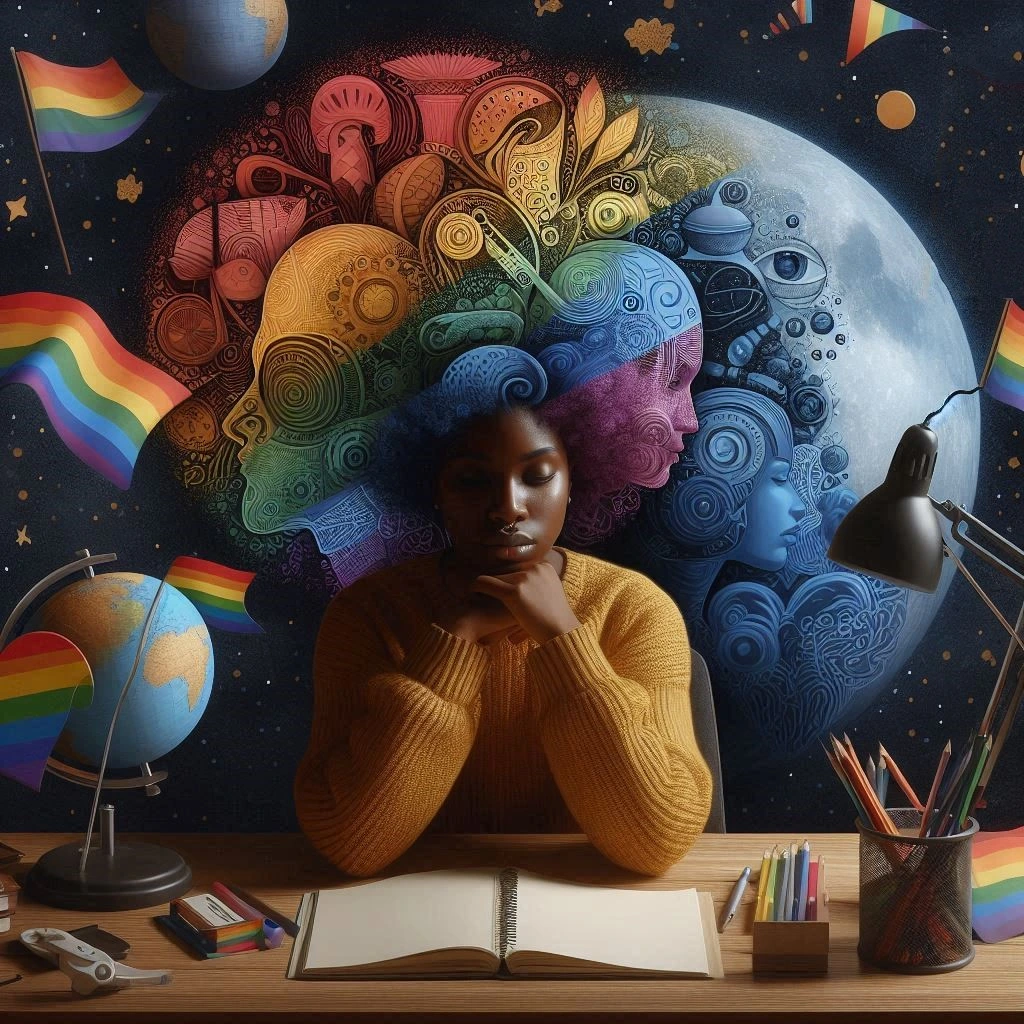
As we approach the end of LGBTQ+ History Month this February 2025, it’s an opportune time to reflect on the rich tapestry of activism and social change that has shaped our communities. This year’s theme, “Activism and Social Change,” honours the relentless efforts of individuals who have championed equality and justice. For Black LGBTQ+ individuals, the intersection of race, sexual orientation, and gender as marginalised identities presents unique challenges, particularly concerning mental health, where these often compound the struggles. And right here in Hackney, where diversity thrives, we must pay particular attention to the mental health of Black LGBTQ+ individuals. As a counsellor born and bred in these East London streets and a Black British man of Afro-Caribbean heritage, I understand the complexities of navigating multiple identities. My practice here in Hackney is built on the belief that therapy should be a space for understanding, growth, and empowerment. This philosophy is particularly relevant when we consider the layered experiences of Black LGBTQ+ individuals. Understanding Intersectionality Intersectionality, a term coined by Kimberlé Crenshaw, highlights how various social and political identities combine to create unique modes of discrimination and privilege. For Black LGBTQ+ individuals, this means facing not only homophobia and transphobia but also racism, often within both the wider society and within LGBTQ+ spaces. This convergence of oppressions can have a profound impact on mental well-being. The Impact of Minority Stress Minority stress theory posits that individuals from stigmatized groups experience chronic stress due to systemic discrimination and social prejudice. For Black LGBTQ+ people, this stress is multifaceted: they may face racism within LGBTQ+ spaces and homophobia or transphobia within Black communities. This dual discrimination can lead to heightened anxiety, depression, and a sense of isolation. The combined factors produce a mental health disparity that becomes even more pronounced. Factors such as cultural insensitivity in therapeutic settings, underrepresentation of Black therapists, and economic barriers further exacerbate these challenges. Studies have shown that Black LGBTQ+ individuals are at a higher risk for mental health disparities. The Trevor Project in America notes that Black LGBTQ+ youth are more likely to experience poor mental health outcomes, including increased rates of anxiety and depression, compared to their heterosexual and cisgender peers. Here in the UK, the relevance of this statement is also true. This underscores the need for culturally competent and intersectionally aware mental health services. A Culturally Sensitive Therapeutic Approach In my practice, I adopt an integrative counselling approach, combining person-centred and psychodynamic modalities. This allows for flexibility in addressing the unique needs of each client. Central to my work is the recognition of the impact of lived experiences on mental health. By acknowledging the systemic inequalities and personal histories that shape my clients’ realities, therapy becomes a collaborative journey toward healing. Creating a safe, non-judgmental space is paramount. I emphasise the importance of a strong therapeutic relationship built on trust, respect, and openness. Clients are encouraged to express their authentic selves without fear of discrimination. This environment fosters trust and facilitates open dialogue about the challenges they face at the intersection of their identities. Community and Support Networks Building and engaging with supportive communities can significantly enhance the mental well-being of Black LGBTQ+ individuals. Organisations like the Black Emotional and Mental Health Collective (BEAM) work to remove barriers to mental health care in Black communities. Such groups provide culturally relevant resources and spaces where individuals can find solidarity and understanding. In Hackney, local initiatives and support groups offer safe spaces for Black LGBTQ+ individuals to connect and share their experiences. Engaging with these communities can reduce feelings of isolation and promote a sense of belonging. Representation, for some, matters profoundly in mental health. For Black LGBTQ+ individuals, having therapists who understand their cultural background and lived experiences can make a significant difference. It’s essential to support and promote the training of Black LGBTQ+ therapists and to create platforms where their voices are amplified. Embracing Activism and Social Change This year’s LGBTQ+ History Month theme serves as a reminder of the power of activism in driving social change. Figures like Ivor Cummings, a Black British civil servant who played a pivotal role in supporting Caribbean immigrants during the 1940s, exemplify the impact of intersectional advocacy. The Role of Allies and Society Allies play a crucial role in supporting Black LGBTQ+ individuals. Active allyship involves educating oneself about the unique challenges faced by this community, challenging discriminatory practices, and advocating for inclusive policies. By fostering environments that celebrate diversity and promote equity, society can help alleviate some of the systemic pressures contributing to minority stress. Moving Forward Addressing the mental health needs of Black LGBTQ+ individuals requires a multifaceted approach: Cultural Competence in Therapy: Therapists must engage in continuous learning to understand the unique cultural contexts of their clients. Community Engagement: Building strong support networks within communities can provide safe spaces for individuals to share experiences and access resources. Policy Advocacy: Advocating for policies that address systemic inequalities in mental health services is crucial for long-term change. As we honour the legacy of activists who have paved the way, let us commit to fostering environments where Black LGBTQ+ individuals feel seen, heard, and supported. Through collective effort, we can work towards a future where mental health services are accessible and affirming for all. References: The Trevor Project. (2023). Supporting Black LGBTQ+ Youth Mental Health. Retrieved from https://www.thetrevorproject.org/resources/guide/supporting-black-lgbtq-youth-mental-health/? Schools OUT UK. (2025). LGBT+ History Month 2025. Retrieved from https://lgbtplushistorymonth.co.uk/lgbt-history-month-2025 Weekes, P. (n.d.). Paul Weekes Therapy. Retrieved from https://paulweekestherapy.com/ Wikipedia contributors. (2025, February 24). LGBTQ+ History Month. In Wikipedia, The Free Encyclopedia. Retrieved from https://en.wikipedia.org/wiki/LGBTQ_History_Month? Wikipedia contributors. (2025, February 24). Ivor Cummings. In Wikipedia, The Free Encyclopedia. Retrieved from https://en.wikipedia.org/wiki/LGBTQ_History_Month? Resources: https://hcvs.org.uk/about-us/ https://www.lovehackney.uk/
7. The Role of Music, Dance, and Art in Healing in Black Cultures
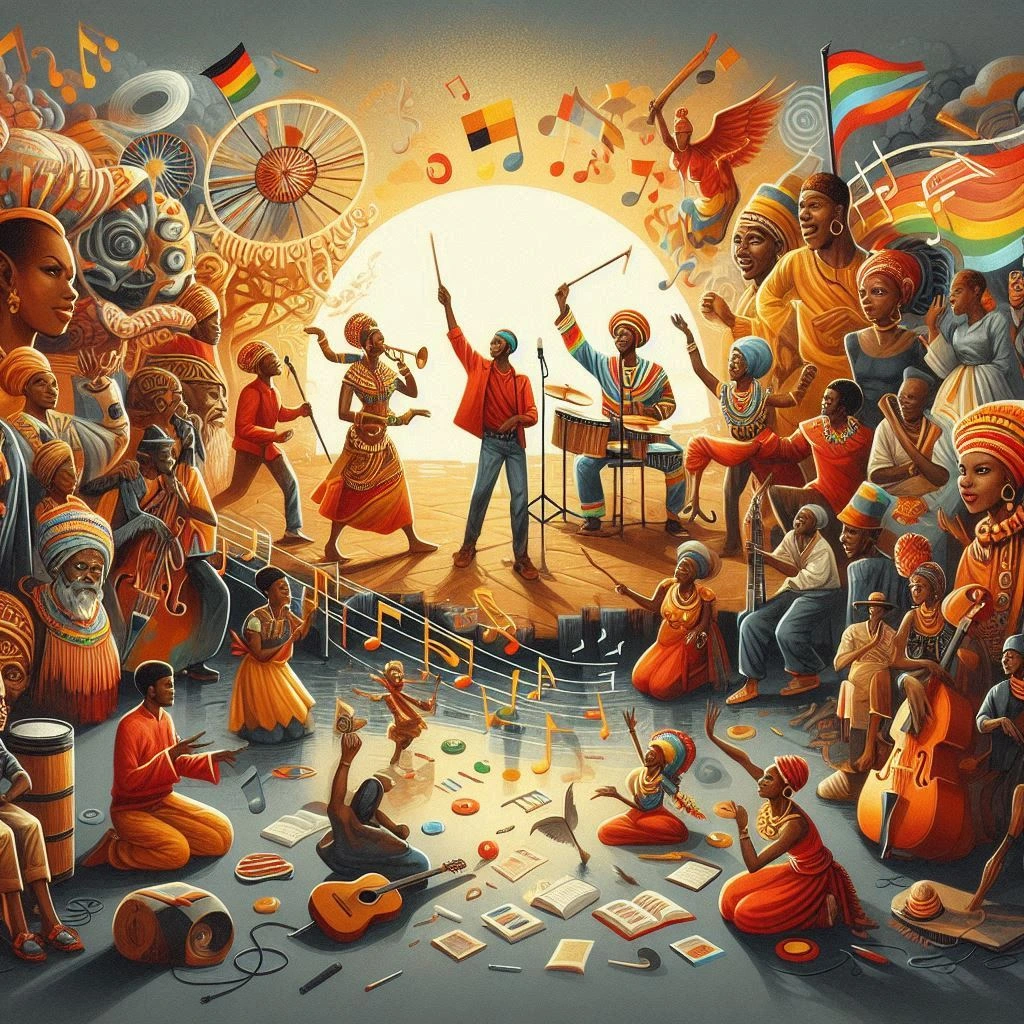
I look back on moments of my childhood, adolescence, through to those of recent years, and it’s easy to locate experiences where I was captivated by colours, forms, and compositions or carried away on a rhythmic vibration that seemed to all but consume me. This speaks to the transformative power of music, dance, and art. Growing up in an Afro-Caribbean household, these forms of expression were more than just entertainment; they were interwoven with the navigation of our lived experiences. Today, as a practicing counsellor serving the same diverse community, I see these cultural practices as profound avenues for healing and resilience. As well as opportunities for connection with self and others. Historical Roots of Healing Through the Arts The Black diaspora has long understood the therapeutic value of creative expression. From the polyrhythmic drumbeats of West Africa to the soulful strains of reggae and gospel, music has always been a vehicle for storytelling, emotional release, and communal bonding. Dance, too, has served as a physical manifestation of joy, grief, and resistance—a language beyond words. Art, whether through vibrant textiles, intricate carvings, or street murals, reflects the struggles and triumphs of our communities. In the context of the Afro-Caribbean experience, these cultural practices were vital in the face of systemic oppression. During the era of slavery, music and dance provided enslaved people with a sense of identity and hope. They encoded messages of resistance and freedom, preserving cultural memory despite efforts to erase it. Even now, these art forms serve as a bridge between generations, ensuring that heritage is celebrated and passed down. Music: A Balm for the Soul Growing up in Hackney, the sound of reggae, ska, and lovers’ rock filled the air. These genres, rooted in the Afro-Caribbean experience, carried messages of resilience, unity, and social justice. Bob Marley’s lyrics, for instance, spoke of liberation and collective healing, resonating deeply with our struggles in a post-colonial Britain. In my counselling practice, I often encourage clients to use creative expression as a therapeutic tool. Listening to music from one’s cultural heritage can evoke a sense of belonging and pride. For some, creating music becomes a way to process trauma. Research supports this, with studies showing that music therapy can reduce symptoms of anxiety and depression (Kim et al., 2006). In Black cultures, the communal aspect of music—whether through jam sessions, church choirs, or events like Notting Hill Carnival, featuring open air sound systems—further amplifies its healing effects as a collective energy. Dance: Movement as Medicine Dance, like music, is deeply ingrained in Black cultures. From the electrifying rhythms of Soca to the spiritual movements of African traditional dances, dance offers a way to express emotions that words cannot capture. In the 1980s, Hackney’s dancehalls were places where we could momentarily escape the harsh realities of racial discrimination and economic struggle. The communal energy was palpable; it was healing in motion. Research into dance therapy highlights its ability to reduce stress, improve mood, and foster a sense of connection (Pylvänen et al., 2015). For many clients in therapy, especially those dealing with trauma, dance becomes a safe way to reconnect with their bodies. Afro-Caribbean dance forms, with their emphasis on grounding and rhythm, are particularly effective in this regard. They remind us that our bodies are not just sites of pain but also vessels of joy and resilience. Art: A Canvas for Healing Art, in its many forms, has always been a powerful medium for Black expression. The murals in Hackney often depict colourful images, some of which are not just art; they are acts of affirmations, denoting unity, diversity, difference, and resilience. Growing up, I remember my parents’ generation using art to protest against injustices like police brutality and housing discrimination. For clients who find it difficult to articulate their feelings verbally, creating art provides an alternative language. It allows them to externalise their emotions and gain perspective. Research confirms the benefits of art therapy, particularly for individuals dealing with PTSD or grief (Malchiodi, 2003). In Black cultures, where silence around mental health issues can still be a barrier, art becomes a vital outlet for expression and healing. The Role of Community One of the most powerful aspects of music, dance, and art in Black cultures is their communal nature. Healing in these contexts is rarely a solitary journey. Whether it’s a carnival parade, a gospel service, or a local art exhibition, these gatherings create spaces where individuals can feel seen, heard, and supported. For many in Hackney, these events are lifelines, offering both joy and solidarity. As a counsellor, I encourage clients to engage with these communal practices. Joining a drumming circle, attending a dance workshop, or participating in a community art project can provide a sense of belonging and purpose. These activities remind us that healing is not just an individual pursuit but a collective one. Conclusion Music, dance, and art are not just cultural expressions; they are essential tools for healing and resilience in Black cultures. As someone who has lived in Hackney all my life and now practices here also, I have seen how these practices sustain our community through challenging times. For those navigating mental health struggles, engaging with these art forms can offer a path to healing that is both personal and deeply rooted in heritage and connection. In the words of Nina Simone, “An artist’s duty is to reflect the times in which we live.” For the Black community, our art not only reflects our times but also heals our souls. References Kim, Y., Wigram, T., & Gold, C. (2006). The effects of music therapy on individuals with mental health problems: A meta-analysis. Journal of Music Therapy, 43(4), 289-305. Malchiodi, C. A. (2003). Handbook of Art Therapy. Guilford Press. Pylvänen, A., & Häkkinen, K. (2015). Dance therapy: A healing art. The Arts in Psychotherapy, 42, 39-45.
6. Historical Trauma and Its Lasting Impact on Black Mental Health
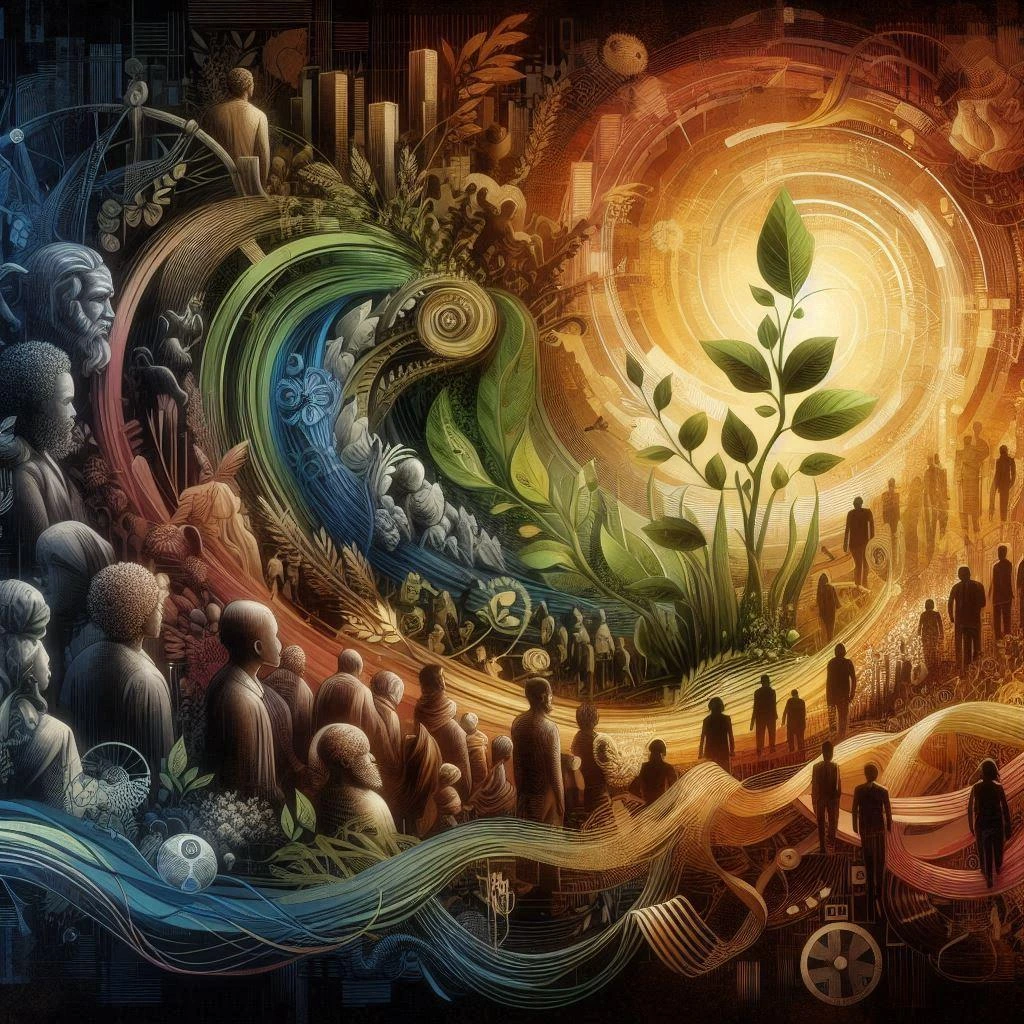
I have witnessed firsthand the enduring impact of historical trauma on Black mental health within our community. Being of Afro-Caribbean heritage, my lived experience informs much of my practice and deepens my understanding of how collective past experiences ripple into the present, shaping the mental health and wellbeing of individuals and families. What is Historical Trauma? Historical trauma refers to the cumulative emotional and psychological wounds passed down through generations as a result of historical injustices, systemic oppression, and collective adversity. For Black communities, this trauma is rooted in the transatlantic slave trade, colonial exploitation, and racial discrimination that have left indelible marks on our identities, self-perceptions, and interpersonal relationships. Unlike personal trauma, historical trauma operates on a collective level, embedding itself in the cultural fabric and influencing behaviors, beliefs, and coping mechanisms. A Legacy of Oppression Growing up in Hackney, I heard stories from elders about their arrival in the UK during the Windrush era. They spoke of hopes for opportunity and prosperity but were met with overt racism, exclusion, and systemic barriers. Their experiences—facing housing discrimination, limited job prospects, and violent policing—echoed the oppression their ancestors endured under colonial rule. These shared narratives of struggle and resilience have shaped our community’s collective consciousness. The structural inequalities that emerged from these historical injustices continue to manifest today. Research highlights the disproportionate rates of unemployment, poverty, and incarceration among Black people in the UK. These systemic issues are not just socioeconomic; they have profound implications for mental health. The stress of navigating a society rife with microaggressions and structural racism exacerbates anxiety, depression, and feelings of hopelessness. The Intergenerational Transmission of Trauma Historical trauma does not merely belong to the past; it reverberates through families and communities. Psychologists have documented how trauma is transmitted across generations via behaviors, beliefs, and even genetic changes—a process called epigenetics. For instance, parents who endured racial trauma might inadvertently pass on heightened stress responses or coping mechanisms to their children, who then internalize the fear and vigilance of living in a discriminatory environment. In my counselling work, I have observed how this intergenerational trauma unfolds. A mother who experienced racism in the workplace may unconsciously impart a sense of hyper-awareness to her children, urging them to work twice as hard and trust no one. While these coping strategies are protective, they can also breed anxiety and erode self-worth. Without space to process these inherited wounds, individuals may find themselves caught in cycles of pain and disconnection. The Stigma Around Mental Health Another significant barrier to addressing historical trauma in Black communities is the stigma surrounding mental health. For many of us, seeking help is perceived as a weakness or a betrayal of the resilience our ancestors displayed in the face of adversity. This stigma is compounded by cultural and systemic factors, such as mistrust of healthcare institutions due to historical abuses and contemporary biases. As a Black British counsellor in Hackney, I’ve made it a mission to challenge these stigmas within my practice. Normalizing conversations about mental health, offering culturally sensitive care, and advocating for accessible services are essential steps in breaking the silence around these issues. Our mental health struggles are not personal failings but reflections of deeply entrenched societal inequities. Healing Through Connection Healing from historical trauma requires a holistic approach that acknowledges the cultural and historical context of Black lives. One of the most powerful tools we have is community. Shared spaces where we can process our experiences, celebrate our heritage, and support one another are invaluable. Whether through group therapy, cultural events, or storytelling, fostering connection helps us reclaim agency and resilience. In my practice, I also incorporate practices rooted in Afro-Caribbean traditions, such as mindfulness techniques inspired by ancestral wisdom and creative expression through music and art. These culturally affirming approaches not only resonate with clients but also honor the strengths embedded in our history. Looking Forward Addressing the impact of historical trauma on Black mental health is not only a personal endeavor but a societal imperative. It requires systemic change—from dismantling racist structures to increasing representation in mental health professions. As a counsellor, I am committed to creating a safe space where clients feel seen, heard, and empowered to break cycles of trauma. Growing up and working in Hackney, I see both the scars and the resilience of my community every day. Acknowledging our history, embracing our heritage, and prioritizing mental health are acts of resistance and healing. Together, we can rewrite the narrative and build a future where our collective wounds transform into sources of strength. References Brave Heart, M. Y. H. (1998). The historical trauma response among Natives and its relationship to substance abuse: A Lakota illustration. Journal of Psychoactive Drugs, 35(1), 7-13. Yehuda, R., & Lehrner, A. (2018). Intergenerational transmission of trauma effects: putative role of epigenetic mechanisms. World Psychiatry, 17(3), 243-257. Adelaja, A. (2020). The impact of structural racism on mental health in Black communities in the UK. Mental Health Today. Fernando, S. (2017). Institutional racism in British psychiatry. Ethnic and Racial Studies, 40(13), 2407-2423.
5. Identifying Trauma in the Black Community and Ways to Heal

As a Black British counsellor from the east end of London, my journey has been shaped by our community’s richness and challenges. Growing up, I witnessed the resilience of African and Caribbean families like mine, but I also observed the subtle and overt impacts of systemic racism, generational struggles, and cultural disconnection. Today, as a practicing counsellor in the same community, I see the echoes of these experiences manifesting as trauma—a silent burden that many carry without even realising it. This blog aims to shed light on how trauma uniquely impacts the Black community and explore pathways towards healing. Recognising Trauma in the Black Community Trauma in the Black community often stems from a combination of personal, intergenerational, and systemic factors. Unlike singular traumatic events—such as an accident or assault—our trauma is often layered, stemming from repeated exposure to racism, economic disparity, and disenfranchisement. This is sometimes referred to as racial trauma. Intergenerational Trauma The history of slavery, colonialism, and systemic racism continues to reverberate through Black communities. Studies have shown that trauma can be passed down through generations not only culturally but also biologically (Yehuda et al., 2016). For Afro-Caribbean families in Hackney, this often appears as a deep-rooted mistrust of institutions or an internalised expectation to endure hardship silently. Community and Environmental Factors Hackney, with its rich cultural diversity, has also been a site of social upheaval and economic inequality. During my youth in the 1970s and 1980s, we faced disproportionate policing, housing challenges, and limited opportunities. Today, while the borough has evolved, gentrification has created new forms of displacement and stress. For many, these ongoing pressures exacerbate feelings of insecurity and loss. Unseen Symptoms Trauma doesn’t always announce itself loudly. Instead, it can linger in the form of anxiety, hypervigilance, or even physical ailments such as high blood pressure and chronic pain. It can also lead to maladaptive coping mechanisms like substance use or withdrawal from social connections. Within Black communities, there is often a stigma around mental health issues, leading many to internalise their struggles rather than seeking help. Breaking the Silence To address trauma effectively, we must first break the silence surrounding it. Historically, our community has leaned heavily on faith, family, and community networks for emotional support. While these are vital pillars of strength, they can sometimes discourage vulnerability, perpetuating the idea that we must be “strong” at all times. Shifting Cultural Norms As a counsellor, I’ve seen how powerful it can be for clients to redefine strength. Strength doesn’t mean suppressing pain—it means facing it. Encouraging open conversations about mental health within families, churches, and community spaces is a crucial first step. Campaigns like Black Minds Matter UK have already begun to challenge these taboos, providing safe spaces for Black individuals to explore their mental health. Representation Matters One of the barriers to healing in our community is the lack of representation in mental health services. Many Black individuals feel that white therapists cannot fully understand their lived experiences. That’s why it’s essential for institutions to invest in training more Black therapists and for those of us in the field to actively reach out to our communities. Pathways to Healing Healing from trauma is not a linear journey, and there is no one-size-fits-all approach. However, there are several strategies that have proven effective: Culturally Sensitive Therapy As a Black therapist, I integrate cultural awareness into my practice. This means acknowledging the unique challenges faced by Black clients and validating their experiences. Techniques like narrative therapy, which allows clients to reframe their stories, can be particularly empowering for those who have felt voiceless. Community Healing In Hackney, we’ve seen the power of collective healing through initiatives like community workshops, support groups, and cultural events. These spaces not only provide solidarity but also celebrate our resilience and heritage, reinforcing a sense of belonging. Mind-Body Practices Trauma is stored in the body, and practices like yoga, meditation, and breathwork can help release it. For some, engaging in culturally resonant activities—such as African dance or drumming—can also serve as a therapeutic outlet. Addressing Systemic Issues Healing cannot happen in isolation from the broader social context. Advocacy for systemic change—whether through education, policy reform, or grassroots activism—is essential. In Hackney, organizations working to combat youth violence, provide housing support, and mentor young people are making a tangible difference in reducing the systemic stressors that contribute to trauma. Moving Forward Together As someone who has both lived and worked in Hackney, I know firsthand the challenges and triumphs of our community. Identifying and addressing trauma is not about pathologizing our struggles but about recognizing our humanity. Healing requires us to confront the pain of the past while building hope for the future. If you’re struggling with trauma or know someone who is, I encourage you to seek support. Whether through therapy, community resources, or simply starting a conversation, every step matters. Together, we can create a culture of healing, one that honours our past while paving the way for future generations to thrive. References Yehuda, R., Daskalakis, N. P., Desarnaud, F., et al. (2016). Epigenetic biomarkers as predictors and correlates of symptom improvement following psychotherapy in combat veterans with PTSD. Frontiers in Psychiatry, 7, 1–14. Black Minds Matter UK. (n.d.). Retrieved from https://blackmindsmatter.co.uk Hackney Council. (2021). Community initiatives for mental health. Retrieved from https://hackney.gov.uk
4. Debunking Common Myths About Therapy in Black Communities
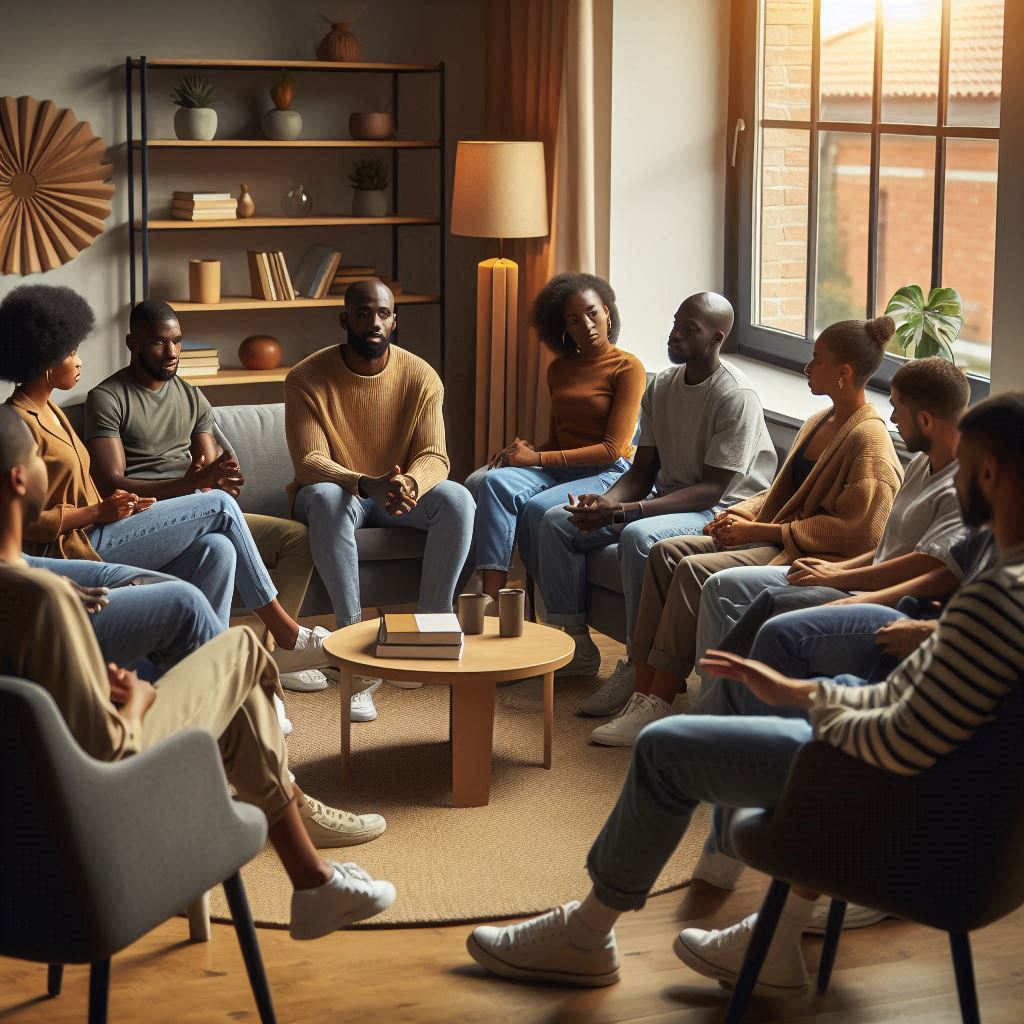
As someone born and raised in Hackney, East London, in the vibrant cultural mix, I’ve witnessed firsthand the challenges and triumphs of Black communities in this area. Growing up Afro-Caribbean in Hackney, mental health wasn’t a topic that came up often at the dinner table or during community gatherings. Today, as a counsellor practicing in my hometown, I see both the progress we’ve made and the persistent myths that keep some from seeking the support they need. Therapy is not—and never was—meant to be an experience reserved for others. It is for us too. However, there are misconceptions about therapy in Black communities that need addressing. Here, I aim to debunk some of these myths, providing clarity and encouragement to those who may be hesitant. Myth 1: “Therapy is for white people.” This myth is deeply rooted in the historical exclusion and marginalisation Black communities have faced in healthcare and mental health systems. Growing up, many of us saw therapy as something irrelevant to our struggles, something distant from our lived realities. However, therapy is for everyone. Black people face unique stressors—racial discrimination, microaggressions, and systemic inequalities—that can significantly impact mental health. Culturally sensitive therapists, many of whom are Black themselves, understand these dynamics and can provide a safe space to explore these experiences. Therapists like myself have trained to honour cultural backgrounds and lived experiences. Seeking therapy doesn’t mean aligning with “other people’s” ideas of wellness—it’s about reclaiming your mental health on your own terms. Myth 2: “Talking to family or friends is enough.” Our Afro-Caribbean heritage places high value on community and familial support. Growing up, our elders were often our counsellors, offering wisdom drawn from life’s hardships. While these connections are invaluable, they can’t replace professional mental health care. A therapist provides a neutral, nonjudgmental perspective that friends and family may not be equipped to offer. Therapy involves evidence-based techniques that help you process trauma, manage anxiety, or navigate life changes in ways that even the most loving relative may not know how to support. Family and community are vital, but they don’t negate the need for a trained professional who can provide tailored tools for healing and growth. Myth 3: “Therapy means something is wrong with you.” One of the most damaging misconceptions is that seeking therapy is an admission of weakness or failure. This belief, unfortunately, often leads to suffering in silence. The truth is, therapy is a proactive step toward self-improvement and empowerment. Much like going to the gym strengthens your body, therapy strengthens your mind. It’s not about “fixing” something broken but about enhancing your resilience and well-being. I’ve worked with clients from all walks of life—students, parents, professionals—who’ve come to therapy not because they’re “broken,” but because they want to thrive. Seeking help is a sign of strength, not weakness. Myth 4: “Therapists won’t understand me.” It’s true that mental health services haven’t always been welcoming or inclusive for Black communities. The lack of Black therapists and cultural competence in the profession has historically been a barrier. However, this is changing. In Hackney and beyond, there is a growing movement of Black therapists, myself included, who are committed to understanding and addressing the specific needs of our communities. Therapists who are not Black are increasingly being trained in cultural sensitivity to ensure they can provide effective care. If you’ve had a negative experience in the past, I encourage you not to give up. Finding the right therapist is a bit like finding the right pair of shoes—you might need to try a few before you find the perfect fit. Myth 5: “Prayer or faith should be enough.” Faith and spirituality are cornerstones for many in the Black community, offering comfort and strength in difficult times. However, therapy and faith don’t have to be mutually exclusive. I often work with clients who integrate their spiritual beliefs into their therapeutic journey. Therapy isn’t about replacing your faith—it’s about complementing it. Both can coexist, providing a fuller, richer approach to mental health and well-being. Moving Forward Breaking the stigma around therapy in Black communities starts with open conversations and accessible resources. In Hackney, initiatives like Black Thrive and the Black and Minority Ethnic Counselling Service are working to bridge the gap, ensuring that mental health support is culturally relevant and accessible. As a counsellor who grew up in this borough, I see how much strength exists in our community. Therapy doesn’t take away from that strength—it enhances it. The more we challenge these myths, the more we create space for healing and growth, not just for individuals but for entire families and communities. If you’re considering therapy, I encourage you to take that step. It’s not just a choice for yourself; it’s a choice that ripples outward, breaking barriers for others to follow. Resources for Further Support: Black Thrive London Mind in Hackney Therapy for Black Girls Let’s normalise seeking help and embracing mental health care. Our community deserves it.
3. The Importance of Culturally Sensitive Mental Health Care
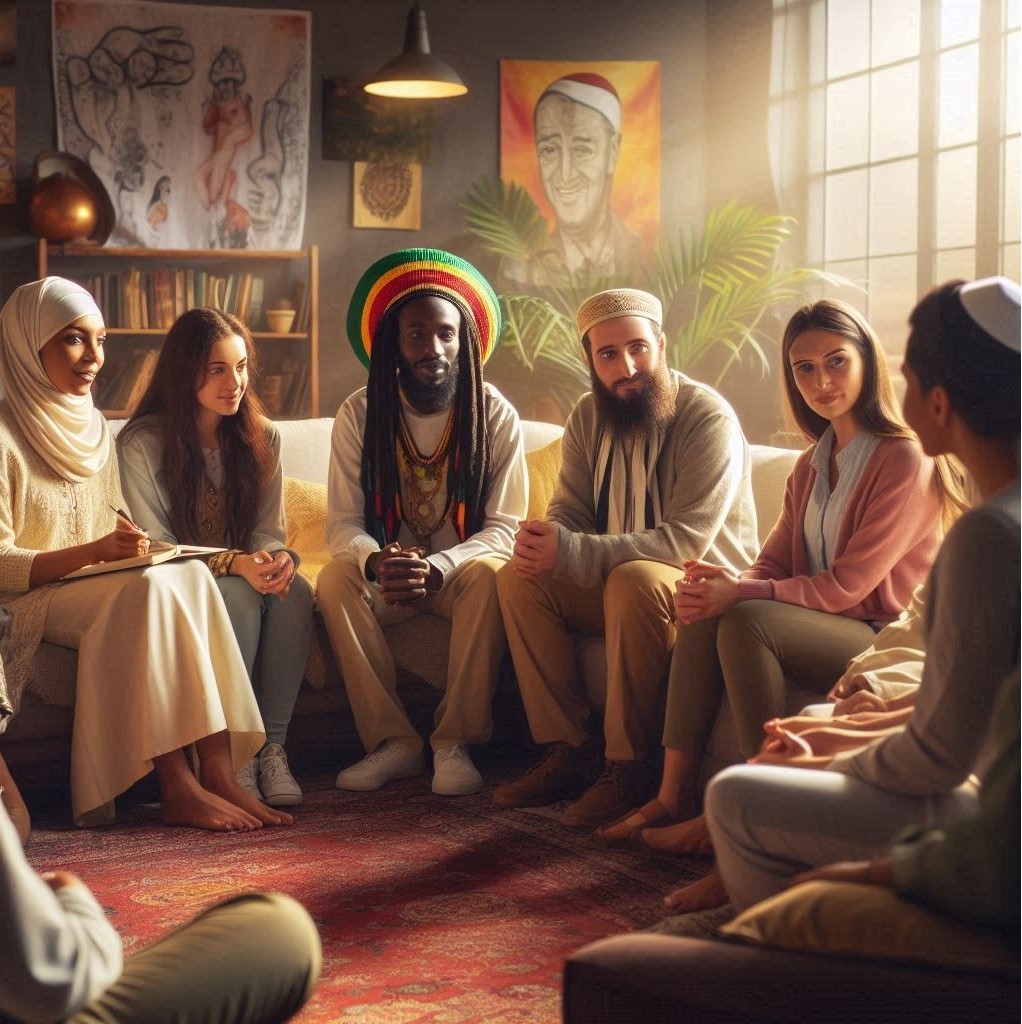
As a counsellor born and raised in Hackney, I’ve witnessed the profound changes in my community over the decades. Hackney has always been a melting pot of cultures, with people from Afro-Caribbean, African, South Asian, and many other backgrounds living side by side. Growing up as a Black British man of Afro-Caribbean heritage, I experienced both the richness of my culture and the systemic hindrances faced by mine and other communities of colour. Today, as a counsellor practicing in Hackney, I see how these dynamics continue to shape mental health experiences. Culturally sensitive mental health care is not just a preference—it is a necessity. Our cultural backgrounds deeply influence how we perceive mental health, how we communicate distress, and how we seek and respond to help. When these factors are overlooked, the quality of care suffers, leaving many underserved and alienated. Why Culture Matters in Mental Health Culture shapes our values, beliefs, and ways of understanding the world. For example, in Afro-Caribbean communities, there is often an emphasis on resilience and collective strength, born from a history of enduring systemic racism, slavery, and colonialism. While these values are empowering, they can also make it harder to seek help for mental health struggles, as vulnerability might be misinterpreted as weakness (Mental Health Foundation, 2021). In mainstream mental health care, many therapeutic models are based on Western frameworks, which may not fully resonate with individuals from non-Western backgrounds. For example, a client from an Afro-Caribbean heritage may place a strong emphasis on family and community, while traditional therapy models often prioritise individualism. Without cultural sensitivity, these nuances can be missed, leaving clients feeling misunderstood or invalidated (British Psychological Society, 2020). Barriers to Accessing Mental Health Care Mistrust of the System In Black communities, historical and ongoing experiences of systemic racism have bred mistrust in institutions, including health care. Black people in the UK are disproportionately sectioned under the Mental Health Act, which reinforces fears of being overpoliced or misunderstood in vulnerable moments (Mind, 2020). As a counsellor, I’ve heard clients share concerns about whether their therapist will truly understand their experiences of racism, cultural identity, or microaggressions. Without cultural sensitivity, therapy can feel like yet another space where they must explain or defend their existence. Stigma and Silence In many cultures, mental health struggles are stigmatised, and seeking professional help can be seen as a sign of weakness. Growing up in Hackney, I saw how mental health issues were often dismissed with phrases like, “Just pray about it” or “Man up.” Faith and resilience are important parts of many communities, but they should complement, not replace, mental health support. The Role of Culturally Sensitive Care Culturally sensitive mental health care addresses these barriers by acknowledging and respecting the cultural contexts in which people live. It doesn’t just consider symptoms and diagnoses—it takes into account the client’s cultural identity, values, and lived experiences. Building Trust and Understanding A culturally sensitive therapist is open to learning about the client’s cultural background and how it informs their mental health. This can include acknowledging systemic issues such as racism or gentrification, which are particularly relevant in places like Hackney. For example, the rapid changes in the area have left many long-term residents feeling displaced or invisible—a theme that often emerges in therapy. Adapting Therapeutic Approaches Cultural sensitivity also means tailoring therapeutic approaches to align with the client’s worldview. For some, this might mean incorporating discussions of spirituality or family dynamics into therapy. For others, it could involve addressing the impact of historical trauma, such as the legacy of slavery or colonialism, on their mental health. Representation Matters While cultural sensitivity is vital for all therapists, representation within the mental health field itself is equally important. Seeing a therapist who shares your cultural background can create an immediate sense of connection and understanding. As a Black British counsellor, I often hear from clients that they feel relieved to talk to someone who “gets it.” Representation validates experiences and challenges the notion that mental health care is only for certain groups. How We Can Move Forward Education and Training Therapists and mental health professionals must commit to ongoing education in cultural competency. This includes understanding the historical and social contexts that shape clients’ experiences as well as addressing their own biases. Community-Based Interventions Bringing mental health care into community spaces can help bridge the gap for those who feel alienated by traditional systems. In Hackney, initiatives like culturally specific support groups and partnerships with faith leaders have shown promise in reducing stigma and increasing access to care (Hackney Council, 2021). Advocacy for Systemic Change Culturally sensitive care also requires systemic change. This means addressing the structural inequalities that disproportionately impact Black and minority ethnic communities, from housing and education to employment and health care access. A Call to Action As someone who grew up in Hackney and continues to serve its diverse population, I am passionate about making mental health care accessible and meaningful for everyone. Cultural sensitivity is not an optional extra—it is fundamental to providing effective support. If we want to break down barriers and truly address mental health in our communities, we must start by listening. Listening to the stories, struggles, and strengths of those we serve. By doing so, we can create a mental health system that is not only inclusive but transformative. References British Psychological Society. (2020). Understanding racial disparities in mental health. Hackney Council. (2021). Mental health and community support in Hackney. Mental Health Foundation. (2021). Black and minority ethnic mental health in the UK. (2020). Mental health in Black communities: Breaking barriers. Culturally sensitive mental health care is the bridge between understanding and healing. It acknowledges that every client brings their own story, shaped by culture, history, and identity, and it ensures those stories are heard and valued. Together, we can make mental health care work for everyone.
2. How to Start Therapy When You Don’t See Representation

Starting therapy is a big step, and for many, it’s a vulnerable leap into the unknown. For those of us from Black and minority ethnic communities, the journey to therapy can feel even more daunting when the professionals available don’t reflect our cultural background, experiences, or identities. As a Black British counsellor from Afro-Caribbean heritage, born and raised in Hackney, East London, I understand the challenges faced by those who don’t see representation in the mental health field. I also understand the immense courage it takes to begin therapy despite these obstacles. This blog is for anyone wondering how to take that first step when it feels like the system wasn’t built with you in mind. The Importance of Representation in Therapy Representation matters in every aspect of life, but in therapy, it can be especially important. When clients see therapists who share their cultural background, it can foster trust and understanding from the outset. For many in Black communities, therapy can feel inaccessible because of the perception that counsellors won’t understand our experiences of racism, cultural identity, or the nuanced dynamics within our families and communities (British Psychological Society, 2020). But what happens when you don’t have access to a therapist who looks like you or shares your cultural heritage? Is therapy still worth pursuing? The answer is yes. While representation enhances the therapeutic relationship, it’s not the only factor that determines whether therapy can work for you. Steps to Starting Therapy Without Representation 1. Reflect on What You Need from Therapy Before starting therapy, take some time to think about what you want from the process. Are you seeking support for specific issues, such as anxiety or depression? Do you want to explore your identity, family dynamics, or cultural experiences? Identifying your needs will help you find a therapist whose approach aligns with your goals, even if they don’t share your background. 2. Ask Questions During Initial Consultations Most therapists offer an initial consultation, which is an opportunity for you to ask questions and gauge whether you feel comfortable with them. Use this time to ask about their experience working with clients from diverse backgrounds or their understanding of cultural issues. A good therapist will listen without judgement and be open to learning from you. Questions to consider include: Have you worked with clients from Afro-Caribbean or Black British backgrounds? How do you approach issues of race, identity, or cultural dynamics in therapy? Are you comfortable discussing systemic racism or microaggressions? 3. Look for Therapists Committed to Cultural Competency Even if a therapist doesn’t share your background, they can still provide effective support if they’re culturally competent. Culturally competent therapists are those who actively educate themselves about diversity and are sensitive to the unique experiences of their clients (Mind, 2020). You can search for therapists who explicitly mention cultural sensitivity in their profiles. Organisations like the Black, African, and Asian Therapy Network (BAATN) or the British Association for Counselling and Psychotherapy (BACP) often highlight therapists who specialise in diversity. 4. Acknowledge the Power of Shared Humanity While cultural understanding is important, it’s also worth remembering that therapy is a relationship built on empathy, trust, and connection. A skilled therapist, regardless of their background, will prioritise creating a safe space where you feel heard and validated. The shared humanity between client and therapist can be a powerful bridge, even in the absence of cultural similarity (Royal College of Psychiatrists, 2021). 5. Consider Alternative Therapy Formats If you’re struggling to find representation locally, consider online therapy. Digital platforms expand your options, allowing you to connect with therapists from different parts of the country or even internationally. Additionally, group therapy or support groups focused on Black mental health can provide community and solidarity. Challenges and How to Navigate Them Fear of Being Misunderstood Many people worry that a therapist from a different background won’t understand their experiences. It’s okay to voice this concern during sessions. A good therapist will be receptive and willing to explore how their own biases or blind spots might affect the process. The Emotional Labour of Explaining It can feel exhausting to educate a therapist about your culture or experiences of racism. While this is valid, remember that therapy is your space. You are not obligated to explain your entire cultural history; instead, focus on what feels most relevant to your healing. Cost and Accessibility Therapy can be expensive, and private therapy may not always feel accessible. Consider exploring charities or community organisations that provide low-cost counselling, such as Mind in Hackney or culturally focused initiatives like BAATN. Moving Forward with Hope Despite the challenges, therapy can be a transformative journey. In my practice here in Hackney, I’ve seen how powerful it is when clients allow themselves the space to process their emotions, challenge old patterns, and embrace new perspectives. Even when representation isn’t available, healing is still possible. If you’re considering therapy, I encourage you to take that first step. Advocate for your needs, ask the difficult questions, and trust that you deserve support, even if it means navigating a system that doesn’t always reflect your identity. Hackney has changed since my childhood, but the diversity and resilience of its people remain its heartbeat. The same resilience that has sustained our community can guide you as you take this step toward your mental health. References British Psychological Society. (2020). Race and mental health: A call for action. (2020). Mental health experiences in Black communities. Royal College of Psychiatrists. (2021). The importance of cultural competence in therapy. Black, African, and Asian Therapy Network (BAATN). (2022). Directory of diverse therapists. These resources provide further information on navigating therapy and the importance of diversity in mental health. Remember, while representation is ideal, healing can happen in spaces where empathy, understanding, and trust are prioritised.